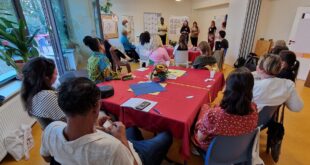The Italian parliament has passed into law a tough anti-migrant and security bill designed to make it easier to deport migrants and restrict residency permits.
The controversial bill, which makes it easier to expel migrants and limits residency permits, was passed in the lower house of parliament with 396 in favour to 99 against on Wednesday (28 November).
“I’m happy, it’s a memorable day,” far-right Interior Minister Matteo Salvini, who is the brain behind the bill, told journalists after the parliamentary vote. The Senate had already given its green light to the bill in September.
As well as making it easier to deport rejected asylum-seekers, the bill allows naturalised migrants to be stripped of Italian citizenship if convicted of terrorism.
The decree also ends two-year “humanitarian protection” residency permits – a lower level of asylum status based on Italian rather than international law – that were awarded to 25 percent of asylum-seekers last year.
Instead, residency permits will be awarded under stricter conditions such as a one-year “special protection” status or a six-month “natural disaster in country of origin” status.
A new procedure to fast-track the expulsion of “dangerous” asylum-seekers will also be implemented. Migrants could now be expelled if they are found guilty of serious crimes such as rape and assault. Previously, this was only possible at the end of a lengthy appeals process. The decree also envisages that asylum-seekers accused of drug dealing will have their applications denied.
The Italian Refugee Council has said it was “seriously concerned” by the new law.
Of the 81,500 decisions made on asylum applications by Italian authorities in 2017, eight percent were granted asylum, 8 % subsidiary protection and 25 % humanitarian protection. The remainder were rejected.
If appeals fail, asylum-seekers face the prospect of being classed as economic migrants who must return to their home countries.
Those seeking refugee status will also now have their requests suspended if they are considered “socially dangerous or convicted in the first instance” of crimes, while their appeals are ongoing.
They will in future be housed in bigger reception centres, while only minors and those with recognised refugee status will be housed in different parts of the country in order to facilitate integration.
“We must welcome those who are fleeing war, but there is no place for economic migrants,” Salvini said. “Whoever flees a war is my brother, but whoever comes here to sell drugs and create disorder must go home.”
Salvini, who is also deputy prime minister, has taken a hard line on immigration since the coalition came to power in June, refusing to allow several ships carrying migrants rescued in the Mediterranean to dock at Italian ports.
Over the past five years, more than 600,000 refugees have reached Italy by risking their lives on board rickety boats in the sea. Some 500,000 of them are still staying in the country.
Sola Jolaoso with agency reports
 THE AFRICAN COURIER. Reporting Africa and its Diaspora! The African Courier is an international magazine published in Germany to report on Africa and the Diaspora African experience. The first issue of the bimonthly magazine appeared on the newsstands on 15 February 1998. The African Courier is a communication forum for European-African political, economic and cultural exchanges, and a voice for Africa in Europe.
THE AFRICAN COURIER. Reporting Africa and its Diaspora! The African Courier is an international magazine published in Germany to report on Africa and the Diaspora African experience. The first issue of the bimonthly magazine appeared on the newsstands on 15 February 1998. The African Courier is a communication forum for European-African political, economic and cultural exchanges, and a voice for Africa in Europe.




























